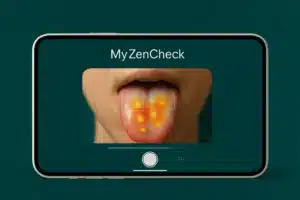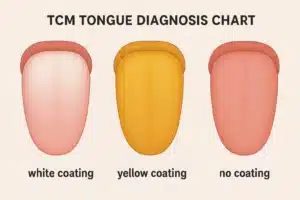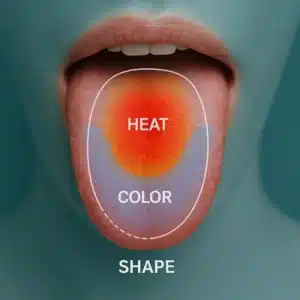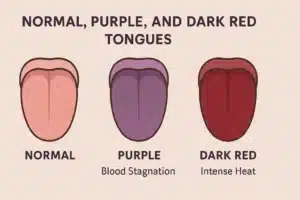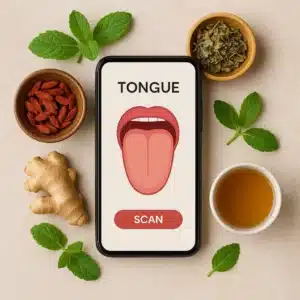In Traditional Chinese Medicine (TCM), your tongue acts like a health report card. Its color, shape, and coating can reveal imbalances before symptoms become obvious. While the tongue body reflects your organ health and energy balance, the tongue coating tells a different story—it shows what’s happening on the surface and inside your digestive system.
If you’ve ever wondered about the tongue coating meaning in TCM tongue diagnosis, here’s what a white, yellow, or no coating might be telling you.
White Tongue Coating Meaning
A white coating is often associated with cold or dampness in the body.
- Thin white coating → Generally healthy digestion or mild Qi deficiency.
- Thick white coating → Signs of dampness and cold, possibly linked to spleen or kidney weakness.
- Dry white coating → May indicate Yang deficiency or fluid depletion.
Common signs: heaviness in the body, fatigue, bloating, loose stools, cold hands and feet.
TCM tips:
- Favor warming foods like ginger, cinnamon, and garlic.
- Avoid excessive raw or cold foods.
- Drink warm herbal teas to support circulation.
Yellow Tongue Coating Meaning
Yellow coating signals heat in the body—sometimes combined with dampness.
- Thin yellow coating → Early stages of heat or mild Qi stagnation.
- Thick yellow coating → Strong heat in the stomach, liver, or gallbladder.
- Sticky yellow coating → Damp-heat, often linked to poor digestion and oily skin.
Common signs: irritability, bitter taste in the mouth, thirst, sweating, acne, or digestive discomfort.
TCM tips:
- Eat cooling foods like cucumber, watermelon, and mint.
- Reduce spicy, fried, and greasy foods.
- Try bitter herbal teas like dandelion or chrysanthemum.
No Tongue Coating (or Very Thin Coating)
A missing or very thin coating usually points to Yin deficiency or a depletion of body fluids. This means your body’s cooling and moistening resources are running low.
Common signs: night sweats, dry mouth, heat sensations in the palms and soles, insomnia, and low stamina.
TCM tips:
- Include Yin-nourishing foods like pears, sesame, tofu, and aloe vera.
- Avoid excessive coffee, alcohol, and spicy foods.
- Prioritize rest, meditation, and gentle exercise like Tai Chi.
When to Seek Guidance
Always try AI tongue diagnostics scan done by MyZenCheck.While self-observation is empowering, a professional TCM tongue diagnosis gives a deeper understanding by considering all aspects of your tongue, pulse, and symptoms. If you notice sudden changes in tongue coating or have persistent symptoms, consult a qualified TCM practitioner.
Key Takeaway
In TCM, white coating means cold or dampness, yellow coating means heat, and no coating means Yin or fluid deficiency. Observing your tongue coating regularly can help you catch early signs of imbalance and take gentle steps toward restoring harmony.
Frequently Asked Questions About Tongue Coating in TCM
What does a white tongue coating mean in TCM?
In Traditional Chinese Medicine, a white tongue coating often points to cold or dampness in the body. A thin white coating can be normal, but a thick white layer may suggest spleen or kidney weakness.
What does a yellow tongue coating mean in TCM?
Yellow tongue coating typically indicates heat in the body, sometimes mixed with dampness. A thin layer suggests mild heat, while a thick or sticky yellow coating signals stronger heat or damp-heat affecting digestion.
What does no tongue coating mean in TCM?
No coating or a very thin layer is often a sign of Yin deficiency or low body fluids. This may be linked to symptoms like night sweats, dry mouth, or a feeling of internal heat.
Can I diagnose myself by looking at my tongue?
While you can get clues by observing your tongue, a full TCM tongue diagnosis should be done by a qualified practitioner who will also assess your pulse and overall health.
How often should I check my tongue coating?
It’s best to check your tongue in the morning before eating or brushing your teeth. Doing this once a week can help you spot changes and monitor improvements if you make diet or lifestyle adjustments.
- AI Tongue Diagnosis Engine – August 2025 Updates & Improvements
- ¿Recubrimiento blanco, amarillo o sin recubrimiento? Lo que el recubrimiento de la lengua revela sobre su cuerpo en la MTC
- AI chequeo de salud de la lengua: Lo que tu lengua dice sobre tu salud
- Entendiendo las Lenguas Púrpura y Oscura: Lo que tu lengua dice sobre tu salud circulatoria
- Del diagnóstico a la acción: Alimentos curativos según su tipo de lengua

